How Fayed built a corrupt system of enablers to carry out his sexual abuse
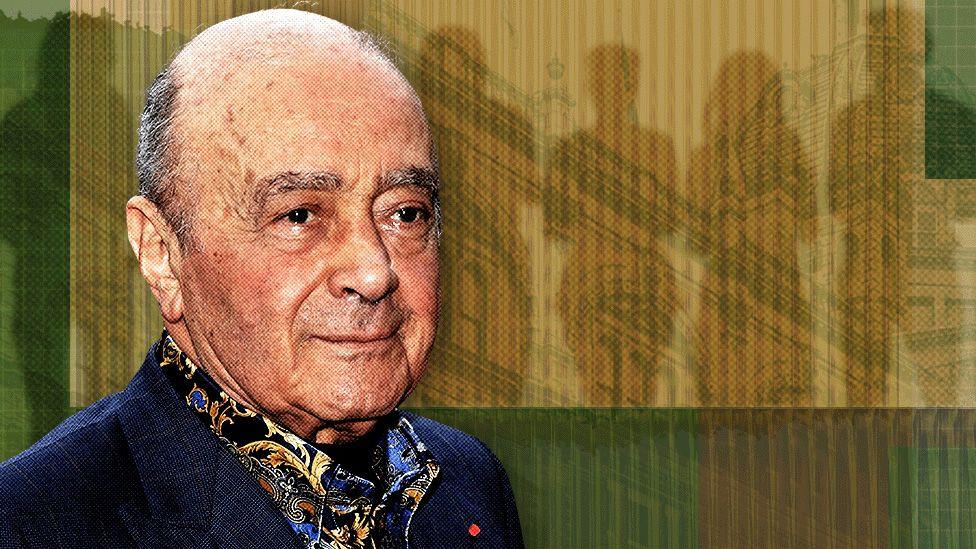
- Published
Kate - not her real name - was 16 and had recently started working at Harrods when Mohamed Al Fayed summoned her to his apartment.
Inside the Park Lane residence, "he tried to pressure me into having sex with him," Kate says. "He tried to be charming… but I kept saying no." Kate says the late Harrods owner's mood changed and the threats started. "He became angry, the doors were locked and I couldn’t get out. He raped me."
Kate did not feel ready to tell her story before the broadcast of the BBC documentary Al Fayed: Predator at Harrods. Now she says she wants people to understand what a monster Fayed was, and her testimony throws more light on the corrupt system at the heart of the company, which has since been sold to new owners.
Like many of the women who say they were assaulted while working for the luxury department store, she recalls the doctors who carried out intimate medical examinations on staff. Others describe the personal assistants who summoned them to Fayed and the security guards who protected the apartment where he carried out many of the attacks.
"There was a whole system to facilitate this," says Dean Armstrong KC, one of the barristers representing some of the alleged victims. How did the system operate?

Soon after she began working at Harrods, Kate says Fayed asked her inappropriate questions about whether she had a boyfriend or was sexually active.
She cannot remember her response, but says Fayed had other ways of finding out the answers he wanted. "It was organised for me to see Dr Ann Coxon of Harley Street for a company medical," Kate says. "It was sold to me as a perk of working in the chairman’s office."
She says Dr Coxon asked to do an internal examination and to test for sexually transmitted infections, including HIV. "I explained that I hadn’t become sexually active yet, and therefore it was unnecessary," she says, adding that her concerns were brushed off.
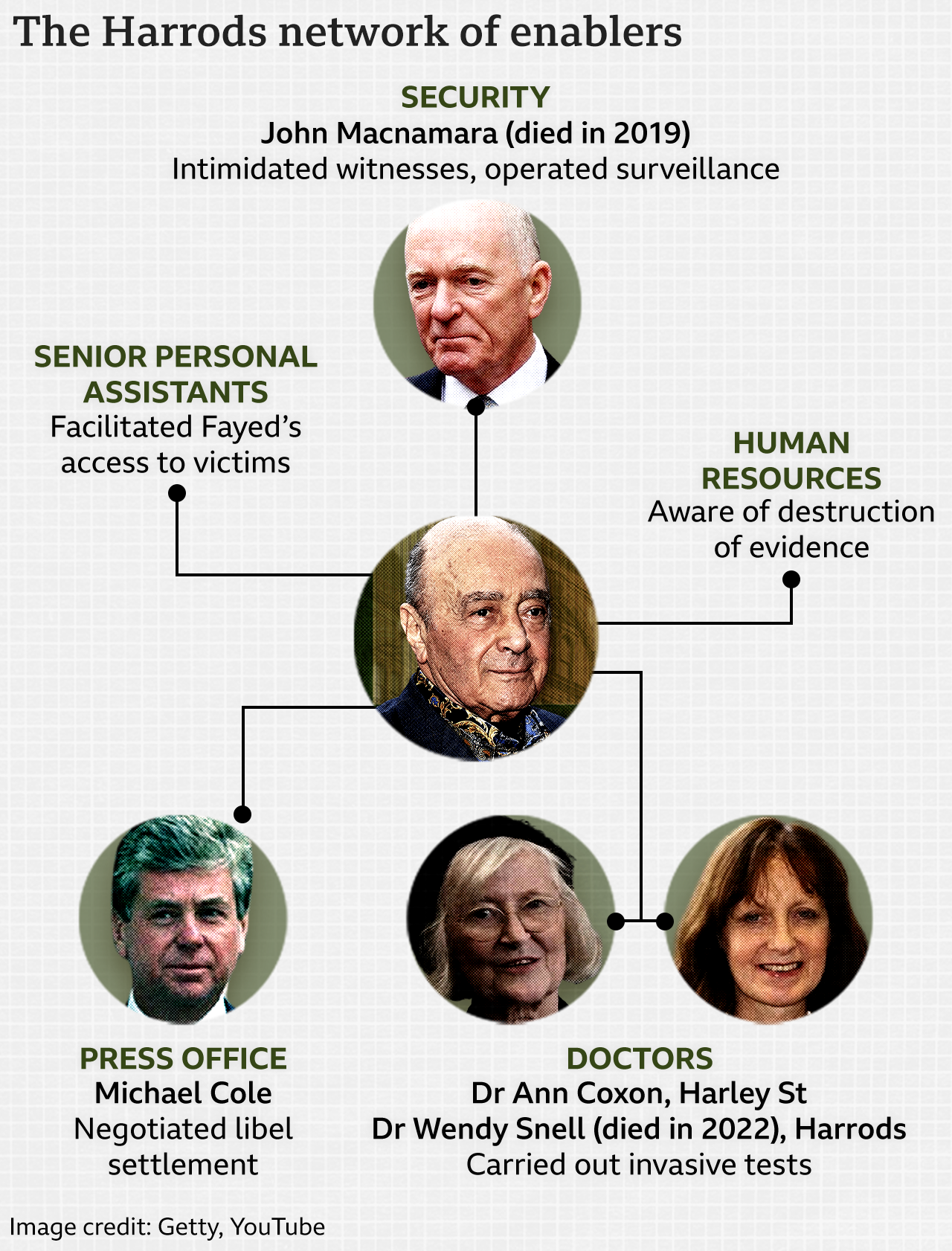
Back at the office, Fayed asked to see Kate. She says he started discussing the intimate details of her medical exam and questioned her “purity”. She says she was embarrassed easily and found the conversation confusing, intrusive and humiliating.
Kate believes the private information provided to Fayed was crucial in enabling the abuse she went on to suffer. "Dr Coxon had given him the all-clear he needed."
It was a recurring theme in our investigation that Fayed was obsessed with finding out whether the women he intended to abuse had any sexually transmitted diseases.
Kate says that she was subsequently raped by Fayed.
Other women who say they were assaulted by Fayed name the Harrods company doctor at the time, Wendy Snell, as carrying out similar examinations. Some of them say Fayed had been told the results of their sexual health tests before they returned to the office.
Dr Snell has since died but Dr Coxon remains registered with the General Medical Council, and several women say they intend to make a formal complaint about her to the regulator.
Dr Coxon has not responded to a request for comment. The GMC said the allegations were “deeply concerning” and it would take appropriate action if it found concerns about the fitness to practice of any doctor.

Lindsay, who worked at Harrods in the 1990s and says Fayed attempted to rape her, believes her medical was organised by one of his senior personal assistants.
"She was following Fayed’s instructions,” she says. “I feel that she recruited us for that purpose, and that purpose only."
Lindsay accuses Harrods of enabling the abuse. "Who needs 25 PAs?" she asks.
Many of the women we spoke to said that some of Fayed’s senior personal assistants were key cogs in the machinery of abuse. After they had had their medical examination results back, they said senior PAs would send them up to Fayed’s office or apartment where they would be abused.
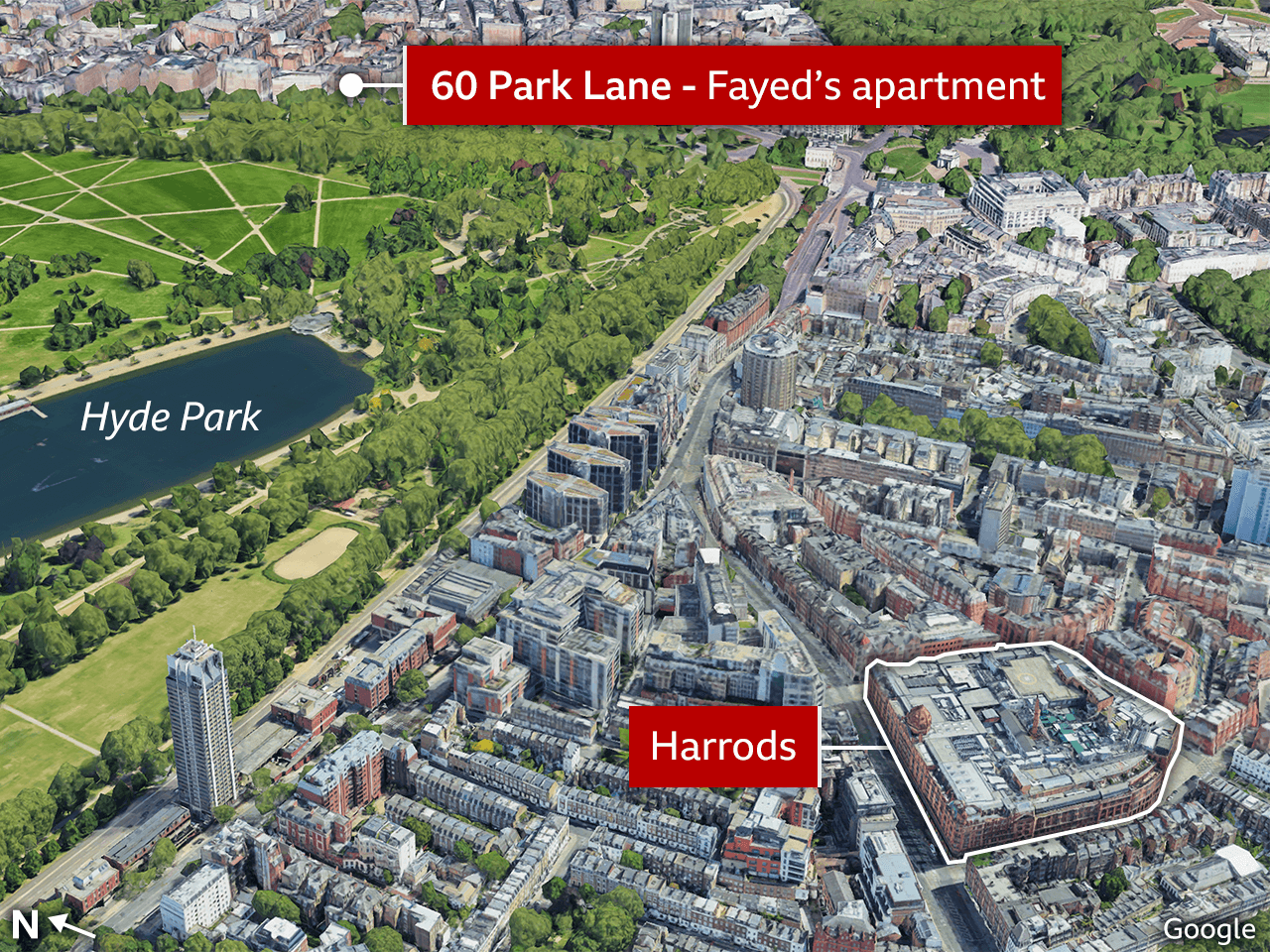
Tamara, who worked in the chairman's office in the 1990s, told the BBC: "Mohamed had this sort of modus operandi every day. He would call one senior assistant and ask which girls were working that day and then one of us would be summoned to his office."
"My recollection would be that the PA’s phone would ring," says Natacha, another survivor. "Then she would turn round to one of us and point and send one of us up to the apartment."
The summons would be on the pretext of taking Fayed’s briefcase down in the lift, the women say. Tamara said that, in reality, "you would be alone in that office, and it would be his opportunity to grope you, molest you".
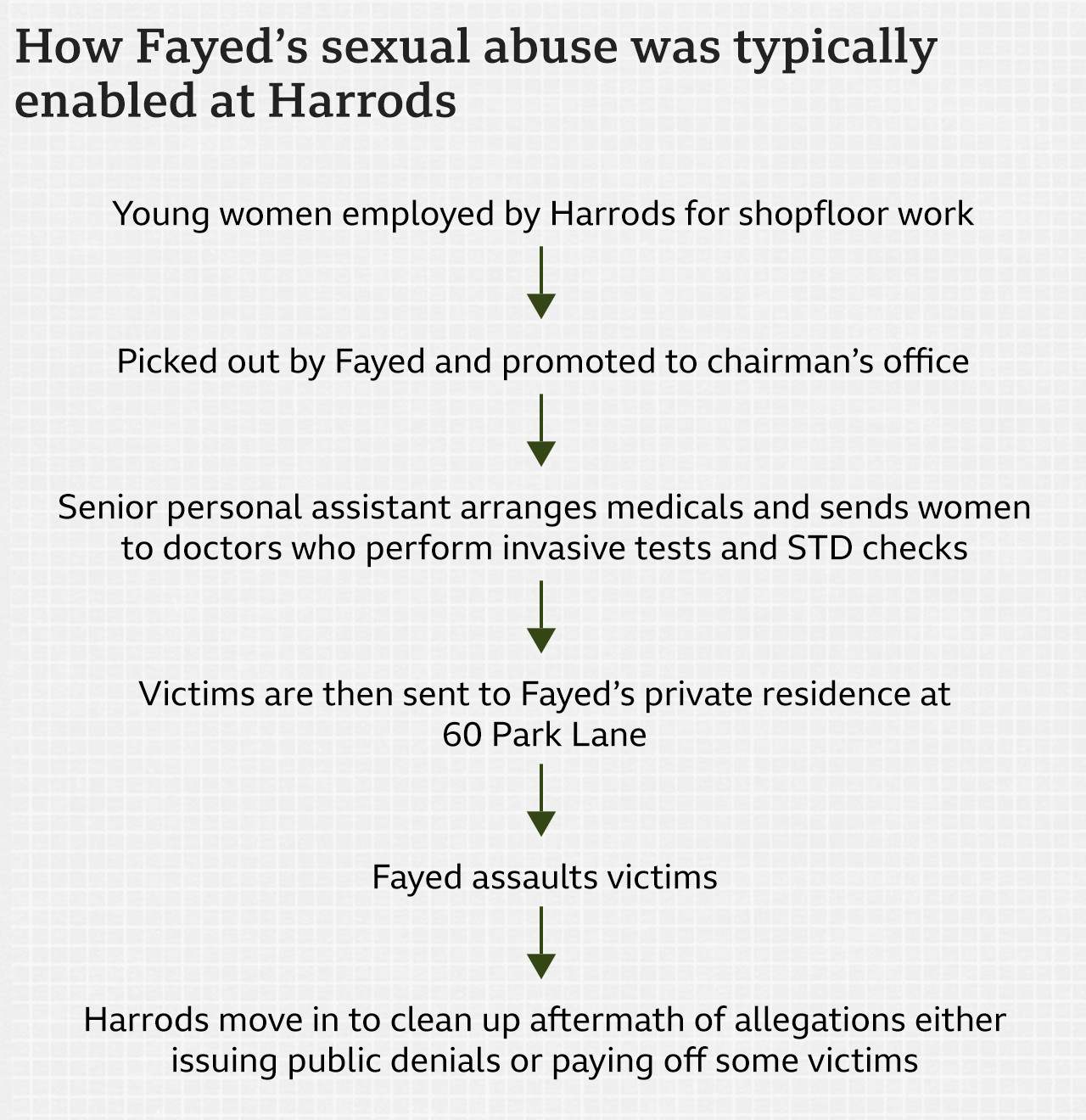
Some of the senior personal assistants and the doctors played a role in what Mr Armstrong, the lawyer for the victims, called a “system of procurement”. But our investigation suggests others were involved in maintaining the silence around the assaults.

Fayed was protected by personal security guards whose job was to stay close to him. Our investigation suggests some of them witnessed the moments shortly before and after some of the assaults.
Steve, who worked as his personal security in the mid-90s, said from a control room in the basement they could only see the corridors leading up to his Park Lane apartment.
"We would only see the girls going in to the door and then closing the door behind him. And in the morning we see them depart or even after an hour. Some wearing Harrods uniforms still," he said.
Some of the women recount how security guards escorted them up to Fayed's apartment. One, whom we are calling Alan, said he was asked to take two girls up to the top floor. Later on, he said he saw one of them crying as they came down in the lift.
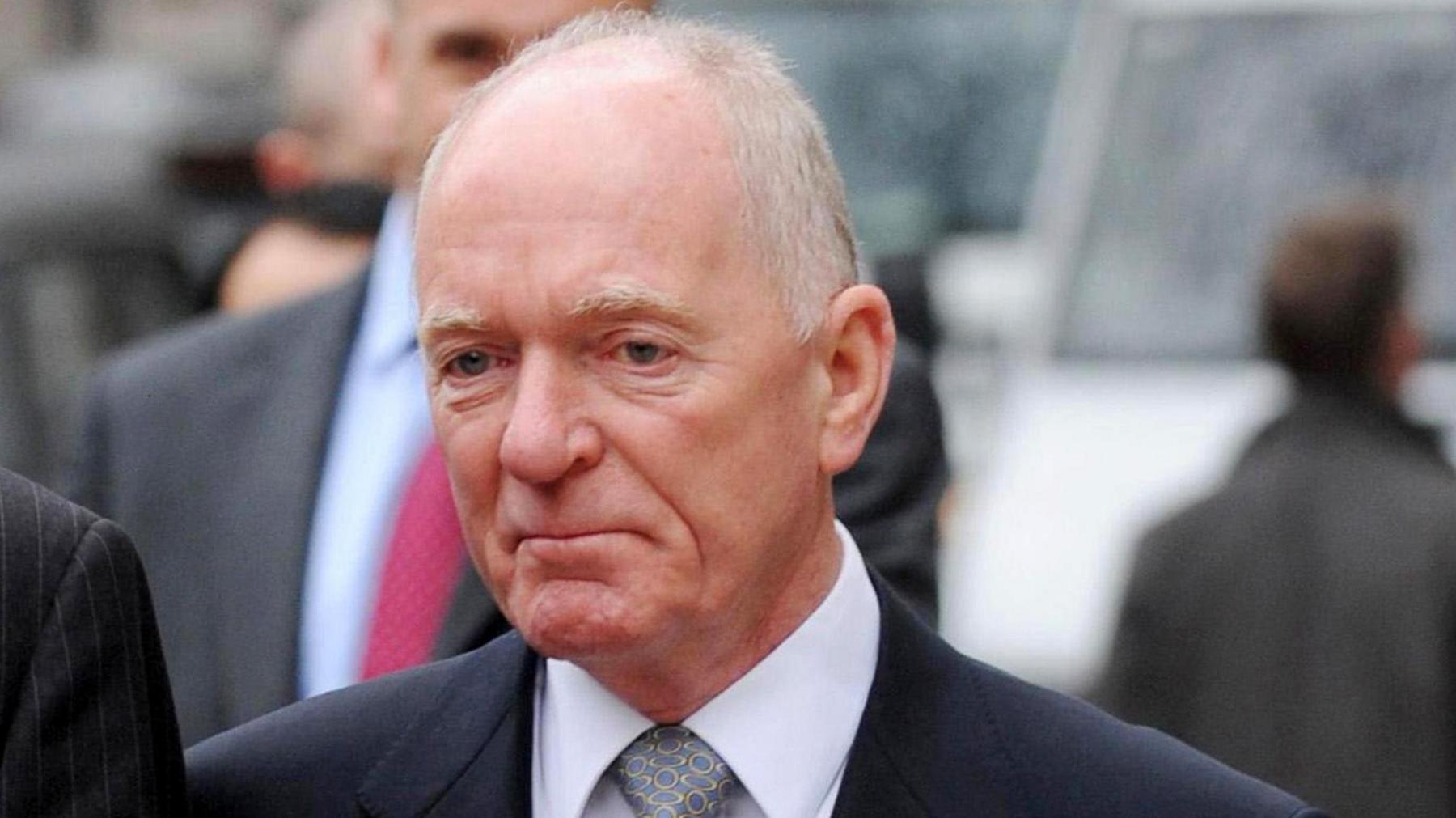
One woman said John Macnamara, then Harrods' head of security, threatened her to prevent her speaking out
He said she described Fayed coming out in his dressing gown and wanting them to sit on his lap "and everything else". "The poor kid was in bits," Alan said.
Alan said he felt helpless to complain to anyone. Whereas our evidence suggests other security staff were working to keep the women silent.
Several of the women say they were told there were cameras planted around Harrods and that the phones were bugged. "That's why none of the other girls, we couldn’t talk to each other properly about it, because we all thought we were being bugged," says one, Sophia.
Another, Sarah, says after she resisted Fayed's attempted assault, one of his close security guards appeared out of nowhere when she was returning home from dinner with her boyfriend.
"I believed that because I had said no to Mohamed, they were just keeping tabs on me to make sure I wasn't telling anybody. Which made me even more fearful," she says.
Alan says he knows of one occasion where John Macnamara, a former senior officer with the Metropolitan Police who was then head of security at Harrods, knocked on a woman’s door and threatened her.
And Alice - not her real name - says after she had had several conversations with Vanity Fair journalist Maureen Orth about her experiences as a personal assistant at Harrods for a 1995 article, she got a call from Mr Macnamara.
She said that he warned her not to be involved in her article and said that if she went against his advice, she should be aware he knew where her parents lived. "It turned me cold," she said.

The 1995 article in Vanity Fair - which made allegations of sexual misconduct, racism and staff surveillance but not of sexual assault - resulted in a libel suit from Fayed.
By 1997, he was ready to drop the case, in a settlement negotiated by the Harrods director of public affairs, Michael Cole.
In return, the magazine would destroy all its evidence, affidavits and correspondence - some of which contained allegations of "serial criminality", according to then-editor Henry Porter.
Mr Cole was also in place when ITV broadcast a film about allegations of Fayed’s sexual harassment, which Fayed denied while Mr Cole worked for him.
Mr Cole has, despite repeated attempts by the BBC, not provided any statement.
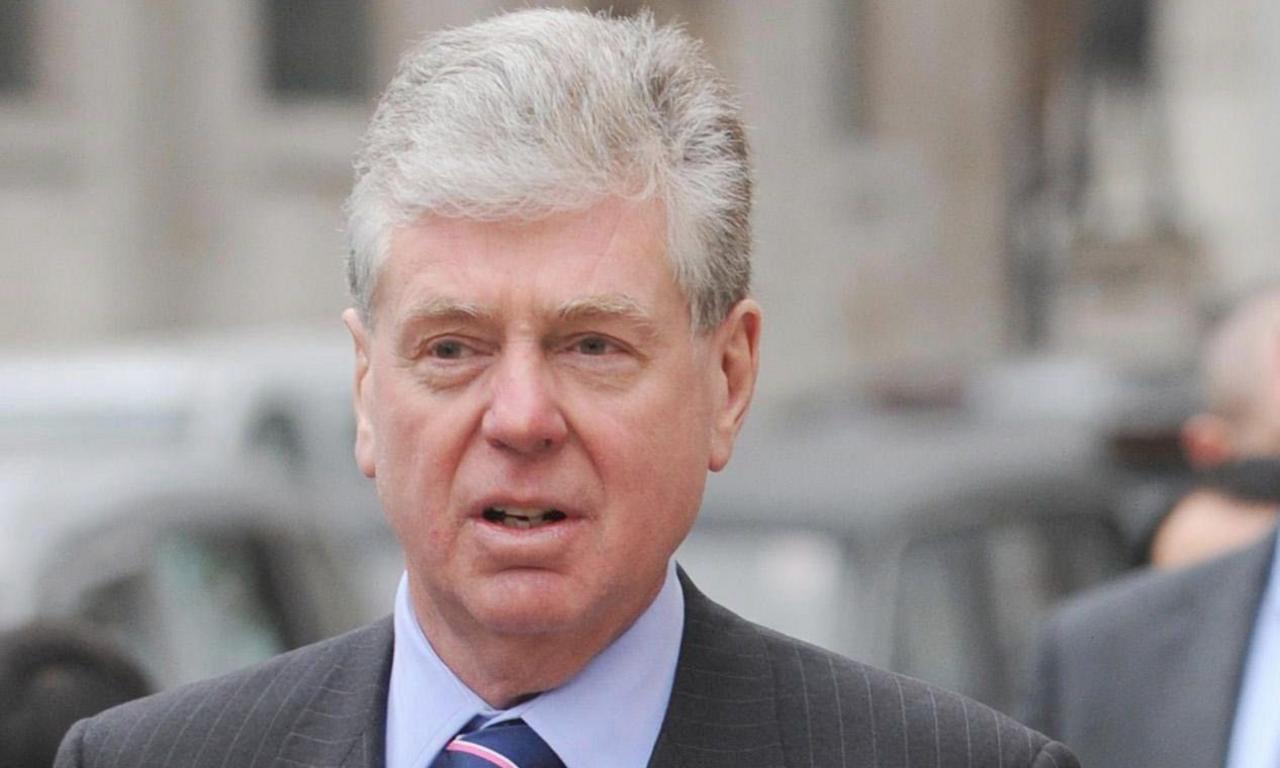
Fayed's spokesman Michael Cole negotiated a legal settlement that meant evidence was destroyed
It was not the only legal case known to senior figures in the management of Harrods which involved allegations of misconduct against Fayed.
Gemma, who became a personal assistant to Fayed in 2007, made recordings of Fayed which became part of a sexual harassment claim.
She says that as part of the settlement, all the evidence - including the tapes and her phone with "really quite nasty voicemails" - was shredded. Someone from HR was present for all this shredding, she says.
"Harrods, I think they knew the significance of having this information available. I think they just wanted to get rid of it as soon as possible and get rid of me as soon as possible."

Many questions still remain about who in positions of responsibility at Harrods knew about allegations against Fayed. Michael Cole was one of the directors of Harrods during the 1990s and went on to defend Fayed when a biography was published in 1998 alleging he was a sexual predator. What did the others know?
We have been unable to find evidence that Harrods investigated any of the allegations while Fayed was chairman. Why not?
James McArthur, who was CEO in 2008, recently told the BBC he was not aware that Fayed had been interviewed by police that year over allegations of sexual assault on a 15-year-old girl.
He did not recall that TV news crews had been outside Harrods reporting on allegations that the company chairman abused a child. That sounds surprising. It was surely not just another day at the office.
For Harrods the questions are piling up.
Harrods told the BBC that it acknowledged during this time that the company “failed our employees who were his victims and for this we sincerely apologise”. But it said “the Harrods of today is a very different organisation” to the one owned by Fayed.
Get in touch
Have you been affected by this story?